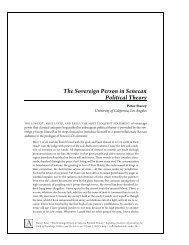Deceit, Desire, and the Literature Professor: Why Girardians Exist
Deceit, Desire, and the Literature Professor: Why Girardians Exist
Deceit, Desire, and the Literature Professor: Why Girardians Exist
You also want an ePaper? Increase the reach of your titles
YUMPU automatically turns print PDFs into web optimized ePapers that Google loves.
LANDY | DECEIT, DESIRE, AND THE LITERATURE PROFESSOR: WHY GIRARDIANS EXIST 13<br />
“IT MAKES US BETTER READERS”<br />
<strong>Why</strong>, <strong>the</strong>n, do so many people still take Girard seriously? One reason that has been advanced is<br />
that his <strong>the</strong>ories—even if exaggerated—make us better readers: having taken <strong>the</strong>m on board,<br />
<strong>the</strong> story goes, we will be better equipped to notice cases of mimetic desire when <strong>the</strong>y actually<br />
crop up. Perhaps that’s true. But it’s worth bearing in mind that statisticians recognize two kinds<br />
of mistake, not just those involving omission (“type II” errors, or false negatives) but also those<br />
involving projection (“type I” errors, or false positives). So while it is indeed a shame to overlook<br />
mimetic desire where it exists, it is just as bad—<strong>and</strong> arguably worse—to “find” it where it does<br />
not exist. Conspiracy <strong>the</strong>orists are arguably better at detecting conspiracies on <strong>the</strong> rare occasions<br />
when <strong>the</strong>y actually happen; in <strong>the</strong> meantime, however, you have to listen to <strong>the</strong>m telling you<br />
that <strong>the</strong> Illuminati are in control of everything, that fluoride is put in our water to make us submissive,<br />
<strong>and</strong> that 9/11 was an inside job. That’s how it is with mimetic <strong>the</strong>ory, too. Like all ideologies,<br />
it replaces a trickle of type II errors with a veritable tsunami of type I errors; <strong>and</strong> that, in<br />
my book, is hardly a great improvement.<br />
The best place to look for evidence of this danger is, of course, in <strong>the</strong> writings of Girard<br />
himself. When you pay attention, it is astonishing just how frequently he gets it wrong about <strong>the</strong><br />
texts he is reading, just how relentlessly he continues pummeling square pegs into round holes.<br />
“It is not an exaggeration,” he claims at one point, “to say that, in all of <strong>the</strong> characters of Remembrance<br />
of Things Past, love is strictly subordinated to jealousy, to <strong>the</strong> presence of <strong>the</strong> rival.” 44 Allow<br />
me to propose a friendly amendment: it is an exaggeration to say that. Notoriously, <strong>the</strong><br />
parents of Proust’s narrator—hardly insignificant figures—are entirely immune to jealousy.<br />
Even Charles Swann, who becomes a fanatically jealous lover, does not begin this way, 45 <strong>and</strong> <strong>the</strong><br />
narrator is quite categorical that <strong>the</strong> new jealousy, far from constituting <strong>the</strong> essence of his passion,<br />
in fact represents a denaturing of that passion. 46 That’s why, when Swann ceases being jealous,<br />
he is none<strong>the</strong>less able to remain in love. 47<br />
More important for our present purposes, consider <strong>the</strong> marvelous scene in The Fugitive<br />
when <strong>the</strong> narrator shows Robert de Saint-Loup a photograph of Albertine, that woman about<br />
whom Saint-Loup has heard so much. “He regarded me as so superior a being,” writes <strong>the</strong> narrator,<br />
“that he felt that for me to be in thrall to ano<strong>the</strong>r creature, she must be quite extraordinary.”<br />
Does Saint-Loup fall madly in love with her, <strong>the</strong>n, when he finally sees her photograph? Does he<br />
heck! He is stunned, can’t believe that <strong>the</strong> marvelous Marcel can have lost his heart to such a<br />
44 DDN, 23. Or again: “Proustian desire is always a borrowed desire” (DDN, 34; emphasis in original).<br />
45 “À la recherche des plaisirs que son agrément nous donnait, s’est brusquement substitué en nous un besoin anxieux,<br />
. . . un besoin absurde, que les lois de ce monde rendent impossible à satisfaire et difficile à guérir—le besoin insensé et<br />
douloureux de le posséder” (Marcel Proust, Du côté de chez Swann [Paris: Gallimard, 1988], 227; my emphasis).<br />
46 “Le plaisir qu’on avait le premier jour espéré des caresses, on le reçoit plus tard, tout dénaturé sous la forme de<br />
paroles amicales, de promesses de présence qui . . . amènent de délicieuses détentes” (Marcel Proust, Le temps retrouvé<br />
[Paris: Gallimard, 1988], 126; my emphasis). Similar remarks could be made about literary models (Botticelli,<br />
Vinteuil): <strong>the</strong>se, too, <strong>the</strong> narrator is quick to point out, intervene belatedly, adding a certain zest to an attraction that<br />
is, in its origin, entirely spontaneous. “Chacun a besoin de trouver des raisons à sa passion, jusqu’à être heureux de<br />
reconnaître dans l’être qu’il aime des qualités que la littérature ou la conversation lui ont appris être de celles qui sont<br />
dignes d’exciter l’amour, jusqu’à les assimiler par imitation et en faire des raisons nouvelles de son amour, ces qualités<br />
fussent-elles les plus opposées à celles que cet amour eût recherchées tant qu’il était spontané” (Proust, Le temps<br />
retrouvé, 402; my emphasis).<br />
47 “Sitôt que . . . le désir de l’enlever à tout autre n’était plus ajouté par la jalousie à son amour, cet amour redevenait<br />
surtout un goût pour les sensations que lui donnait la personne d’Odette” (Proust, Du côté de chez Swann, 299; my<br />
emphasis).



